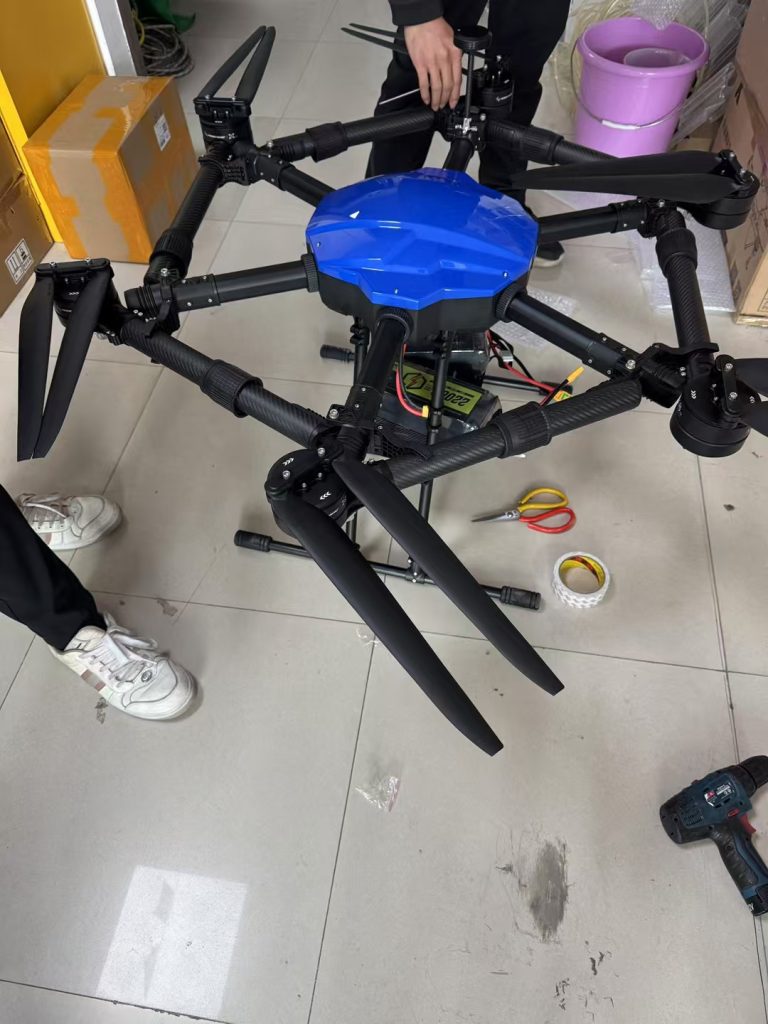
In modern farming, efficiency and precision are essential for maximizing yield and minimizing waste. One of the most transformative innovations in agriculture today is the agricultural drone for spraying. These advanced aerial systems are designed to automate and optimize the application of pesticides, herbicides, and fertilizers, making them an essential tool for large-scale and small-scale farmers alike.
What Is an Agricultural Drone for Spraying?
An agricultural spraying drone is a type of unmanned aerial vehicle (UAV) specifically engineered to spray crops from the air. Equipped with a spraying system, GPS navigation, and intelligent flight control, these drones can cover vast farmland areas with speed and accuracy.
Compared to traditional manual or ground spraying methods, agricultural drones offer greater precision, reduce chemical usage, and minimize health risks to workers.
Key Benefits of Using Spraying Drones in Agriculture
-
Precision Application
Drones can target specific areas of a field, avoiding over-application and reducing chemical runoff. Smart sensors and mapping technology ensure accurate spraying based on real-time crop conditions. -
Labor and Time Saving
With autonomous flight planning, a drone can cover dozens of acres in a short time, significantly reducing the need for manual labor, especially in hilly or hard-to-reach terrains. -
Reduced Chemical Costs
Precise delivery means less waste. Farmers can save up to 30–50% on pesticide and fertilizer use compared to traditional methods. -
Environmentally Friendly
By limiting chemical exposure and runoff, spraying drones help protect surrounding ecosystems and reduce pollution. -
Data Integration
Advanced drones can collect field data while spraying, allowing farmers to monitor plant health and optimize future applications based on AI-driven analysis.
Features to Look for in a Spraying Agricultural Drone
When choosing an agricultural drone for spraying, consider the following features:
-
Payload Capacity: Choose a drone that can carry sufficient liquid to suit your field size, typically 10 to 30 liters or more.
-
Spray Width: A wider spray width increases coverage per flight.
-
Battery Life: Longer flight time equals greater efficiency.
-
Automated Flight Paths: Pre-programmed routes reduce human error.
-
Obstacle Avoidance: Ensures safe operation in complex field environments.
-
Easy Maintenance: Durable, modular designs simplify repair and upkeep.
Use Cases Around the World
Agricultural drones for spraying are already in use across Asia, Africa, Europe, and the Americas. Farmers use them to manage rice, corn, wheat, fruit orchards, and even vineyards. Whether combating pests, applying nutrients, or managing disease outbreaks, spraying drones are proving to be a smart investment for sustainable farming.
Regulations and Safety
Before deploying a spraying drone, it is important to understand local regulations regarding UAVs and agrochemical use. Always follow best practices, including pre-flight checks, operator training, and proper chemical handling.
The Future of Agricultural Spraying
As technology advances, agricultural drones will become even more intelligent, autonomous, and integrated with other smart farming tools. With AI-based spraying systems, real-time field mapping, and cloud data sharing, the next generation of agricultural drones will further revolutionize how food is produced.
Conclusion
The agricultural drone for spraying is more than just a high-tech gadget — it is a practical solution that helps farmers reduce costs, improve crop health, and operate more sustainably. For farms looking to increase productivity while embracing smart agriculture, adopting drone spraying technology is a step forward in the right direction.

没有reply内容